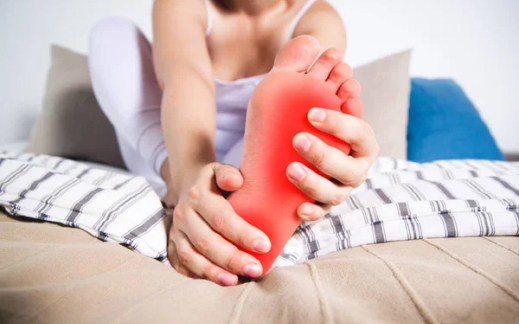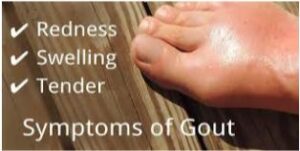Gout not responding to treatment? You are not alone.

If you are reading this, likely you or someone you care about has been diagnosed with gout.
This painful inflammatory condition results when uric acid levels in the bloodstream get too high. When this happens, tiny urate crystals build up in the body. These can become concentrated in the joints, forming small lumps called tophi. Gout often affects the metatarsophalangeal joint (MTP) joint at the base of the big toe. Other joints such as elbows, knees, and ankles are also susceptible.
Symptoms of Gout

-intense joint pain
-lesser pain or discomfort that lasts days or weeks
-inflammation, swelling, and/or discoloration of the affected joint area
Gout is a common disease with increasing incidence, driven mainly by an aging population, with some contribution from the increasing prevalence of obesity and the use of diuretics (often given to treat high blood pressure).
Treatments for Gout
Common treatments for gout usually involve medications. What medications you and your doctor choose will be based on your current health and your own preferences.
Gout medications can be used to treat acute attacks and prevent future attacks. Medications can also reduce your risk of complications from gout, such as the development of tophi from urate crystal deposits.
If your gout pain isn’t too severe you can try some home remedies including cold packs or compresses on the joint to lower inflammation and soothe the ache. Wrap ice in a thin towel and apply it to the joint for up to 20 minutes several times a day. Do not apply ice to your hands or feet if you have nerve problems from diabetes or other causes.
It’s also a good idea to rest the joint until the pain eases up. You probably won’t want to move it much anyway. If you can, raise the joint on a pillow or other soft object. Staying hydrated is also key. When your body doesn’t have enough water, your uric acid levels rise even higher.
Watch what you eat and drink. Foods that are high in substances called purines, such as some seafood, organ meats like liver, and fatty foods, can raise the uric acid in your blood even more. So can fructose-sweetened drinks and alcohol — especially beer.
This condition can usually be managed by diet, lifestyle changes, and medications. However, despite changing food and beverage intake, losing weight, or taking prescribed medications, some patients do not see a decrease in uric acid levels. At this point the condition can be called treatment failure gout or refractory gout
Looking for Solutions
At Injury Care and Family Care Research, we have a study to help patients with refractory gout. For more information, give us a call today! Our staff are happy to answer your questions and see if this study could be right for you.
